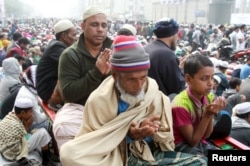For the second time in a week, at least 1 million devotees of the ultraorthodox Islamic movement Tablighi Jamaat are gathering in Bangladesh for the Bishwa Ijtema, one of the world's largest annual Muslim gatherings.
Unlike other religious movements in the Muslim world, Tablighis, as Tablighi Jamaat adherents are called, say they avoid debates over politics, economics and relations with the West. Nor are they interested in charitable works like building schools and clinics.
Their leaders also say they have nothing to do with jihad or terrorism.
50,000 U.S. followers
U.S. officials, however, say the group has been closely monitored since the September 11, 2001, attacks in the United States. And while they do not directly link Tablighis with terrorism, U.S. officials say the group’s beliefs and teachings have been a cornerstone for some members of al-Qaida and other radical Muslim groups.
In 2003, the then-assistant director of the FBI, Michael Heimbach, said there was "a significant presence of Tablighi Jamaat in the United States" and that "al-Qaida used them for recruiting."
In a court filing after the recent terror attack at a social services center in San Bernardino, California, FBI Special Agent Joel Anderson said one of the two people responsible for the assault — Syed Rizwan Farook — was an avid student of the teachings of Tablighi Jamaat. U.S. officials estimate that the group has some 50,000 followers in mosques in the U.S.
Tablighi Jamaat leaders say they have heard Western criticism but steadily maintain that they have no links to terror.
“Islam does not believe in giving trouble to people,” one of the organizers of the Bangladesh event told VOA. “It’s a religion of peace. Our lack of knowledge about our religion misleads us and we give different interpretations. Islam teaches to be kind to even animals.”
Zillur Rahman Khan, a professor emeritus from the University of Wisconsin in Oshkosh, says he has met with group members and that Tablighis are true seekers of peace.
“No, absolutely not,” Khan told VOA when asked if followers had any links with militancy or extremism. He said that Tablighis invite people to Islam, and that true followers of Islam cannot be anything but peaceful.
And, in some parts of the Muslim world, the group has been criticized for being too pacifist, as its teachings do not include taking up arms for the right of self-defense in Islam.
Some Muslim groups slammed Tablighi Jamaat’s official refusal to take a stand on major issues that have inflamed the Muslim world, including the Soviet occupation of Afghanistan in the 1980s and the war in Bosnia in the 1990s.
“They talk only about religion and about the hereafter and do not touch upon worldly affairs,” Pakistan-based political analyst Khadim Hussain told VOA.
25 million members
Founded in India about 75 years ago, the group is one of the most widespread and conservative Islamic movements. According to analysts, it has around 25 million members proselytizing around the globe.
A number of influential personalities have joined the movement, including some popular Pakistani singers and several members of Pakistan's national cricket team.
The group also claims credit for converting the British singer Yusuf Islam, formerly Cat Stevens, and NBA player Kareem Abdul-Jabbar, formerly Lew Alcindor.
The group holds huge annual gatherings in India, Pakistan and Bangladesh, at which clerics and participants discuss religious topics such as faith, human character and obedience to God. Worldly affairs are never part of their discussions.
“This Ijtema [gathering] is meant to bring peace and it is the urge for peace which brings people around the world to come and join in it,” an organizer of the Ijtema in Dhaka told VOA’s Bangla service.





